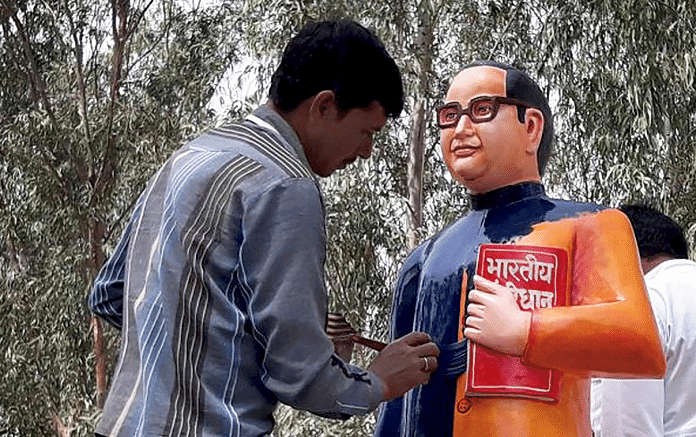Bowing before a statue is not enough to erase Ambedkar’s ideas, deep-rooted as they are amongst Dalits across India.
The BJP thinks it can resolve its rupture with the Dalit community by bowing before Ambedkar.
The symbolism of Prime Minister Narendra Modi giving respect to Ambedkar, saying that Ambedkar is one of the guiding forces for him and his party, is no doubt powerful. But the Ambedkarite movement is not just about Ambedkar’s statue. Like Hindutva, Ambedkarism is an ideology. Through the Dalit movement, this ideology has deep roots.
The centrepiece of the Dalit movement has been the spread of Ambedkar’s ideas through leaflets, booklets, NGOs, political parties, caste associations, and organisations of Dalits working in the public sector and the government.
Hindutva ideologues often use Ambedkar’s critique of Islam to appropriate him. Yet that is of little use to Dalits who see Ambedkar in his totality as the leader who showed them the way out of caste oppression with the slogan, “Educate, Agitate, Organise” against caste.
Here are ten quotes from Ambedkar’s writings that give a glimpse of why the BJP can’t appropriate Ambedkar with hollow symbolism:
1) “If Hindu Raj does become a fact, it will, no doubt be the greatest calamity for this country. No matter what the Hindus say, Hinduism is a menace to liberty, equality and fraternity. It is incompatible with democracy. Hindu Raj must be prevented at any cost.”
2) “Hindu society as such does not exist. It is only a collection of castes. Each caste is conscious of its existence. Its survival is the be-all and end-all of its existence. Castes do not even form a federation. A caste has no feeling that it is affiliated to other castes, except when there is a Hindu-Muslim riot. On all other occasions, each caste endeavours to segregate itself and to distinguish itself from other castes.”
3) “In India, Bhakti or what may be called the path of devotion or hero-worship, plays a part in its politics unequalled in magnitude by the part it plays in the politics of any other country in the world. Bhakti in religion may be a road to the salvation of the soul. But in politics, Bhakti or hero-worship is a sure road to degradation and to eventual dictatorship.”
4) “People are not wrong in observing Caste. In my view, what is wrong is their religion, which has inculcated this notion of Caste. If this is correct, then obviously the enemy, you must grapple with is not the people who observe Caste, but the Shastras which teach them this religion of Caste.”
5) “The Hindus criticise the Mohammedans for having spread their religion by the use of the sword. They also ridicule Christianity on the score of the Inquisition. But really speaking, who is better and more worthy of our respect–the Mohammedans and Christians who attempted to thrust down the throats of unwilling persons what they regarded as necessary for their salvation, or the Hindu who would not spread the light, who would endeavour to keep others in darkness, who would not consent to share his intellectual and social inheritance with those who are ready and willing to make it a part of their own make-up? I have no hesitation in saying that if the Mohammedan has been cruel, the Hindu has been mean; and meanness is worse than cruelty.”
6) “Hinduism is the greatest obstacle to Hindu unity. Hinduism cannot create that longing to belong which is the basis of all social unity. On the contrary Hinduism creates an eagerness to separate.”
7) “Strange as it may appear, Mr Savarkar and Mr Jinnah instead of being opposed to each other on the one nation versus two nations issue are in complete agreement about it. Both agree, not only agree but insist that there are two nations in India—one the Muslim nation and the other Hindu nation.”
8) “The Touchables, whether they are vegetarians or flesh-eaters, are united in their objection to eat cow’s flesh. As against them stand the Untouchables, who eat cow’s flesh without compunction and as a matter of course and habit.”
9) “This attitude of keeping education, wealth and power as a close preserve for themselves and refusing to share it, which the high caste Hindus have developed in their relation with the lower classes of Hindus, is sought to be extended by them to the Muslims. They want to exclude the Muslims from place and power, as they have done to the lower class Hindus. This trait of the high caste Hindus is the key to the understanding of their politics.”
10) “Though I was born a Hindu, I solemnly assure you that I will not die as a Hindu.”




Such a radical post this is . This divide won’t help anyone. Caste must go . And along with the hate on both sides.
Nice Post .Dr.baba saheb ambedkar against hinduism, castism, सामाजिक क्रांति के महानायक महात्मा ज्योतिबा फुले
Any body who wants to appropriate Ambedkar must be a human first and foremost. Hindutavavadis don’t qualify on that count alone.
The tragedy of Unnao is playing out in full public view. Even Arnab Goswami wants Sengar’s scalp. Tokenism will not turn the tide.